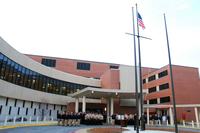The U.S. military's service chiefs pushed back against lawmakers who floated the notion that Congress' continuing failure to agree on a defense budget is "the new normal."
The top generals from the Army, Navy, Air Force and Marine Corps testified Wednesday before the House Armed Services Committee about the crippling effects stopgap budget measures known as continuing resolutions, or CRs, are having on the military's ability to train and conduct combat deployments.
"This is no time, in my professional view, to increase risk to our national security," Army Chief of Staff Gen. Mark Milley said. "A year-long CR or a return to the [budget control act] funding will do just that. It will increase risk to the nation, and it will ultimately result in dead Americans on a future battlefield."
The Defense Department is operating without a full-year appropriation for fiscal 2017, which began Oct. 1. Instead, Congress approved a continuing resolution, which funds federal agencies through April 28. After that date, if a full-year budget or another short-term spending plan isn't in place, the government could shut down.
The House last month passed a full appropriations bill for fiscal 2017, but the Senate hasn't voted on the legislation. Also in limbo this year is the Pentagon's $30 billion supplemental budget request, which neither chamber has approved, bringing its total request for the year to $619 billion.
Meanwhile, President Donald Trump last month released a fiscal 2018 budget blueprint that includes a total of $639 billion for the Defense Department, including $574 billion for the base budget and $65 billion for overseas contingency operations. But the president's full budget request, statutorily due in February, isn't expected to be released until May.
All the service chiefs painted a bleak picture if the military is forced to operate under a continuing resolution for the rest of the year.
It would severely impact readiness, stopping training for Marine and Army combat forces except for deploying units, the chiefs said. It would also cut flying hours for Navy and Air Force pilots and mean fewer ships at sea, they said.
The Army would also have to halt plans of growing to an active force end-strength of 476,000 as mandated in the National Defense Authorization Act, according to Milley, who warned that potential adversaries such as Russia, China and North Korea are only getting stronger.
Rep. William "Mac" Thornberry, a Republican from Texas and chairman of the committee, noted the Defense Department's importance in the federal budget.
"We need to get back to evaluating defense needs on their own without any agreement or disagreement we may have on other issues," he said. "The men and women who serve deserve at least that."
Rep. Adam Smith, a Democrat from Washington and the ranking member of the panel, disagreed, saying the Pentagon can't be viewed separately from other priorities in the federal budget.
"I don't agree that we can somehow pull defense out of the entire rest of the federal government and look at it totally separately, as if all of the other money we spend in the federal government doesn't matter," he said.
Trump's budget request for fiscal 2018 would add $54 billion to defense in part by cutting funding from departments, "including a 31 percent cut in the State Department," Smith said.
Rep. Susan Davis, a Democrat from California, and other lawmakers asked the generals whether the past eight years of operating under continuing resolutions now "in many ways is almost the norm."
"Are there different metrics when it comes to readiness and setting priorities that suggests that we actually have to adapt to this kind of situation and still accomplish the mission?" Davis asked. "What do you think needs to be done differently if this is the new normal?"
Milley offered a blunt response.
"I don't accept that it is the new normal, congresswoman," he said. "Candidly, failure to pass a budget, in my view as both an American citizen and the chief of staff of the United States Army, constitutes professional malpractice."
"I don't think we should accept it as the new normal," he added. "I think we should pass it and pass the supplemental with it and get on with it ... pass the budget."
Speaking later in the hearing, the Navy's top officer, Chief of Naval Operations Adm. John Richardson, said the sea service has made all the fiscal adjustments it can under the continuing resolutions -- an exercise he described as a "tremendous waste of time and energy."
"For this year, we are out of creative space," he said. "I'm not ready to concede that this is the new normal."








